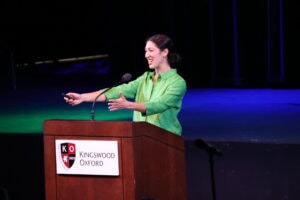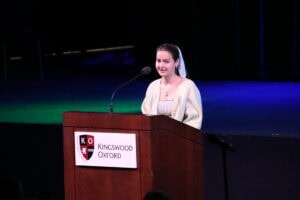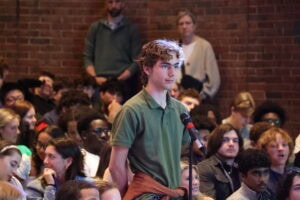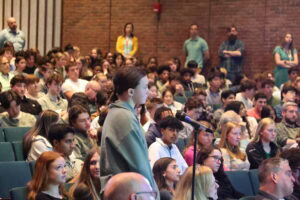April 22, 2025
Climate Justice is Social Justice: An Urgent Call at KO’s Earth Day Assembly
On the 55th anniversary of the first Earth Day, the Kingswood Oxford community gathered for a powerful and deeply personal keynote address from Elana Sulakshana, a distinguished environmental and social justice activist, as part of the Conrad Family Speaker Series. Her speech was more than an educational talk—it was a heartfelt call to action.
Sulakshana, an accomplished climate justice advocate, spoke with urgency and clarity about the interconnectedness of environmental degradation and systemic social injustice. Drawing on personal experience, data, and over a decade of activism, she challenged her audience—students, educators, and community members alike—to see climate justice not as a niche cause, but as a human rights issue.

From the outset, DEIB Director Rich Mutts, set the tone: “Today’s theme—climate justice is social justice—reminds us that the climate crisis doesn’t affect us all equally. Today is not just about listening. It’s a call to action. It’s about getting involved.” Sulakshana,emphasized that vulnerable populations, often already marginalized by race, income, or geography, bear the brunt of climate change. “Solving the climate crisis means tackling injustice and inequities head-on,” she declared.


Sulakshana reminded her audience that Earth Day isn’t just a day to celebrate nature, but a moment for reflection and action. “Today’s not just about listening,” she said. “It’s a call to action… So let’s make today more than just a celebration. Let’s make it a moment for real growth.”
Sulakshana’s journey into climate activism began at just 16 during a summer in Chennai, India. While volunteering with a youth group called Reclaim Our Beaches, she realized that cleaning up trash was just treating the symptoms—not the cause. “We needed to understand the root of the problem,” she explained. The group began conducting trash audits, which revealed a web of global pollution, fueled by single-use plastics, often produced by corporations far away.
But the turning point came when she met a fishing family whose home was being swallowed by a rising sea. “They had contributed very little to the climate crisis but were experiencing the worst of it,” she said. That moment crystallized the injustice at the heart of the climate emergency. “Even if we managed to clean every piece of trash, that beach might not exist in a few years,” she warned.
Sulakshana took time to explain the root systems behind climate change—namely, the fossil fuel economy. Backed by startling statistics and visual aids, she showed that the wealthiest 10% of the global population are responsible for half of all carbon emissions. The richest 1%? Their carbon footprint matches that of two-thirds of the world’s population.
“We call it an extractive economy,” she said, referring to a system that extracts resources and sacrifices communities in the process. “Fossil fuels are the lifeblood of this system. And the burden isn’t evenly shared.”
She explained the concept of sacrifice zones—areas where Black, Brown, Indigenous, and low-income communities are exposed to disproportionate levels of pollution. “The health and safety of people in these communities is effectively being sacrificed for the economic prosperity of others,” she said. Scientific studies, she noted, show Black and Hispanic Americans are exposed to far more pollution than they produce.
In a particularly eye-opening section, Sulakshana exposed the calculated misinformation campaigns of fossil fuel giants. She revealed how companies like ExxonMobil knew as far back as the 1950s that fossil fuel combustion was warming the planet—and yet they buried the science. “Instead of ringing the alarm, they covered it up,” she said.
She even highlighted how the popular idea of a carbon footprint—often used to promote personal responsibility—was originally popularized by BP (British Petroleum) to deflect attention from corporate pollution. “Of course our choices matter,” she acknowledged, “but there’s a limit to how much you can reduce your carbon footprint when fossil fuels are embedded in every part of our lives.”
Sulakshana acknowledged the emotional toll that climate awareness can take—fear, anxiety, grief—but offered a powerful alternative: action. “The more I understood the root causes, the more I saw where I could make a difference.”
Today, she works with Lead Locally, an organization empowering climate justice leaders to run for office, and previously spent five years with Rainforest Action Network, campaigning to end fossil fuel financing by major banks. She’s also a GRIST 50 Fixer and a Jarvis and Constance Doctorow Fellow at Oxford, where she researched global energy transitions.
She also discussed her activism regarding the Line 3 Pipeline, which carries tar sands oil from Canada through tribal lands in Minnesota. She said that scientists found that the emissions of this pipeline would equal a climate footprint of 500 goal plants. The indigenous leaders, mostly women, protested the pipeline as this is their ancestors’ land, the only place in the world that grows wild rice. Sulalshana shared the power of the oil lobby, which criminalizes peaceful protests and donates money to politicians to support the oil company. The protests against the pipeline gained nationwide attention, and some banks and insurers withdrew from the project. However, the oil company prevailed, and the pipeline was constructed. “It’s not the most uplifting story. But it’s important to understand how the fossil fuel company’s agenda is at odds with respecting indigenous rights, protecting safe drinking water, and preserving our planet for future generations.
Sulakshana closed her keynote by encouraging students not just to be informed, but to be active. “Ask yourself: What more can I be doing?” Her message to young people was clear: This crisis is theirs to face—but also theirs to lead.
“You are not too young. You are not too small. You are not alone,” she said.
Luna Hansen, a passionate Form 2 student who introduced Sulakshana,, perhaps said it best: “People like Sulakshana, give me hope. Hope that we can save our planet. Hope that we can be inspired, and together we can change the world.”
As Earth Day 2025 comes to a close, Kingswood Oxford students leave not just informed, but empowered. And as Sulakshana, reminded them, “None of this happens without your ongoing commitment and support.”
